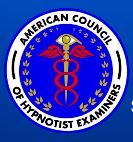PTSD-anon: Recovering from Another’s PTSD
The opinions expressed in this article are the author’s own and do not necessarily reflect the view of the American Council of Hypnotist Examiners.
by Joan Courtney
 I once had a client describe living with her husband’s PTSD as “being in the eye of a tornado, afraid to move in any direction or do anything for fear of what might happen next.” Symptoms of PTSD affect those experiencing trauma in a myriad of negative emotions and behaviors. But what about others in their family? Coworkers? Friends? Want a deeper understanding on how to unlock and work safely and effectively with trauma?
I once had a client describe living with her husband’s PTSD as “being in the eye of a tornado, afraid to move in any direction or do anything for fear of what might happen next.” Symptoms of PTSD affect those experiencing trauma in a myriad of negative emotions and behaviors. But what about others in their family? Coworkers? Friends? Want a deeper understanding on how to unlock and work safely and effectively with trauma?
I have worked with veterans and others diagnosed with this malady since 2000. Approximately 7-8 percent of the population experiences PTSD at some time during their lifetime. The cluster of symptoms known as PTSD can manifest in a variety of ways, distorting reality in response to deep emotional wounds. Behavioral changes lead to problematic lives and devastating consequences, not just for the trauma survivor but for those around them. This population has specialized needs, for they too exhibit signs of PTSD. And the number is growing daily.
What are the symptoms of PTSD?
Symptoms of PTSD can include anxiety and panic disorders, fears and phobias, low self esteem, guilt, difficulty handling stress, insomnia, flashbacks, chronic pain and emotional numbness. Few of these symptoms are conducive to smooth social interactions. Let’s take a closer look at one of these symptoms. Anxiety often manifests itself in conscious and subconscious thoughts of negative memories. This can move into hypervigilance, a feeling as if there’s a radar going on 24/7 in the mind. This in turn leads to insomnia (waking at the slightest sound, movement or change in lighting) that in turn triggers a startle effect. These reactions work to create a domino effect, aggravating yet other symptoms.
What are the ABC’s of anxiety?
The ABC model of anxiety is: the situation (A), leading to the thought (B), which in turn causes the feeling of anxiety (C). This ABC sequence can escalate in a feedback loop. People living with those who have PTSD can often experience extreme anxiety. PTSD behaviors are unpredictable and sometimes violent. This type of anxiety can lead to flash anger with dire emotional and physical consequences. For instance, when the feeling of anxiety itself (“he’s starting to ramp up”) begins to stimulate a further catastrophic thought (“last time, I ended up in the hospital with a broken jaw”), your client then makes a second negative prediction of the future (“I am helpless. My life will always be this way.”) The Vagus nerve is stimulated, causing the sympathetic nervous system to move into a fight-flight-or-freeze behavior. With hypnosis and other techniques, you can help your client slow down, if not stop, this response. Self-regulation allows room for other spontaneous positive behaviors. Your client will learn how to use personal power and strength, and will be well able to direct her own life.
How hypnosis can help
The subconscious mind is the part of the body that triggers thoughts for fight-or-flight-or freeze. If your client interprets a situation (talking with your boss, walking down a dark street, feeling an unusual pain in our body) as frightening, their mind may move into a panic mode. One negative thought triggers another, cascading into an ineffective way of living a life.
Hypnosis and Neuro Linguistic Programming serve as a way to connect with the subconscious mind, allowing it to create other responses and change its reaction to what is coming up. New strategies that would be healthy, positive and beneficial are made available. For instance, instead of fearing a big bear on the road, the mind is able to round the corner and find a small cub playing in the sunshine. Unrealistic self-statements begin to leave, and are replaced by more optimistic ones. Your client can regain control of intrusive thoughts and live a more complete life. You will have the tools to serve as both guide and safety net during this invigorating process. Your confidence will reflect your knowledge and further your client successes through effective, insightful and compassionate healing sessions.
Having over 30 years of experience, Joan Courtney is a clinical hypnotherapist and NLP Practitioner. Throughout her practice, she has worked extensively with veterans, caregivers and others affected by symptoms of PTSD related to fire, earthquakes, and sexual/physical abuse.

